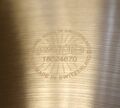Paiste Serial Numbers
Paiste serial numbers were first applied in about 1972. Prior to this there was no accurate means of determining the age of a Paiste other than to identify the years of production for the series or model, when known. These cymbals are referred to as "Pre-Serial" cymbals. It should also be noted that it is not uncommon for serial numbers to be difficult to read due to hammering and lathing. In these cases, the era of the cymbal can usually be identified, but the exact year may not be determined.
Also of important note, cymbals have been found without serial numbers stamped on them from production eras where we might expect them.
This guide does not apply to serial numbers on many prototypes, nor the German made Paistes, which do not seem to be decipherable. (yet!)
1972 - 1981
- Starting some time in 1972 (some believe 1971 but there is currently no strong evidence only strong belief) there were six digit numbers stamped on each cymbal. The specific year is identified by the 'first' digit in the serial number.
- Therefore, "345678" would be from 1973.
- The original 1970's style involved no additional lettering with the serial number such as series name.
- All series (except Paiste 101) were using black labels during this era.
- 1972 Formula 602 Serial.jpg
1972 Formula 602
- 1974 2002 Serial.jpg
1974 2002
- 1978 Formula 602 Serial.jpg
1978 Formula 602
- Black Label Bottom.jpg
Black Label (bottom side)
- Often a series would have an engraving of the series name:
- 2002 Engraving.jpg
2002 Engraving
- Formula 602 Engraving.jpg
Formula 602 Engraving
- Sound Creation Engraving.JPG
Sound Creation Engraving
1981 - 1986
- Starting in 1981, "PAISTE" started to be stamped above the serial number, often along with SERIES. (NOTE: This change occurred not at the beginning of the year, but sometime during it - some examples of the previous style exist with 1981 serial numbers.)
- Like before, the first number indicates year - the following would be an example of 1982:
- Formula 602 was shortened to simply "602".
- Sound Creation was located under PAISTE, due to space limitations.
- The RUDE and Colorsound 5 lines were NOT stamped after PAISTE.
- 1981 RUDE Serial.jpg
1981 RUDE
- 1981 Sound Creation Serial.jpg
1981 Sound Creation
- 1981 2002 Serial.jpg
1981 2002
- 1983 505 Serial.jpg
1983 505
- During this time Paiste changed label colors on some of their series. Formula 602 - Blue, 2002 - Red, 505 - Green, among others.
1986 - 1990
- Sometime during 1986 (probably when they launched all the new lines - 3000, 2000, 1000, etc.), "PAISTE" was stamped above the serial number, without series name.
- Like before, the first number indicates year - the following would be an example of 1989:
- 505 (discontinued by this time) and the 1000 lines both used green logos.
- 2002 and 3000 lines used red logos. The red ink on the 3000 series is a little darker color.
- Formula 602 and 2000 lines both used blue logos.
- 505 16 Crash.jpg
505
- 1000 18 Crash.jpg
1000
- 3000 20 Ride.jpg
3000
- 2000 16 Crash.jpg
2000
1990 - 1995
- Sometime in 1990 the company name was changed to the 'high/low' style" "pAisTe".
- Therefore "pAisTe 345678" would be from 1993.
1995 - 2011
- Sometime in 1995 Paiste started using eight digit serial numbers. In these cases, the first two digits represent the year of production.
- Therefore "96789012" would be from 1996.
- 1999 Signature Serial.jpg
1999 Signature
- 2006 2002 Serial.jpg
2006 2002
- 2007 Signature Serial.jpg
2007 Signature
- 2008 Twenty Serial.jpg
2008 Twenty
- Starting in about 2005, "MADE IN SWITZERLAND" was added to the bottom logo of the 2002 cymbals.
2011 - present
- In the second half of 2011, Paiste started using a laser etched serial number on the cymbal's bottom side. Numbers are not stamped on the top side from this point on. The first two numbers are still the year produced.
- 2012 Giant Beat Serial.jpg
2012 Giant Beat
- 2017 Giant Beat Serial.jpg
2017 Giant Beat
- 2018 Signature Reflector Serial.jpg
2018 Signature Reflector








































